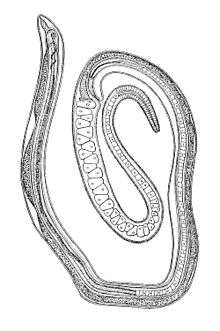Stichosome

The stichosome is composed by very visible cells in Trichosomoides crassicauda
Stichosome (from Greek stichos (στίχος) = row; soma (σῶµα) = body) is a multicellular organ that is very prominent in some stages of nematodes and consists of a longitudinal series of glandular unicellular cells (stichocytes) arranged in a row along the oesophagus that form the posterior esophageal glands. It opens into the esophageal lumen and apparently functions as a secretory gland and storage organ.[1][2][3][4][5][6][7]
References
- ↑ Chitwood, B. G. & Chitwood, M. B. (1950). Introduction to Nematology (Vol. 1). Baltimore: Monumental Printing Co.doi:10.5962/bhl.title.7355
- ↑ Peter J. Gosling. Dictionary of Parasitology. 2005
- ↑ Heinz Mehlhorn. Encyclopedia of Parasitology. 3rd Edition 2008
- ↑ Larry Roberts, John Janovy. Foundations of Parasitology. 8th edition 2008
- ↑ Michael Hutchins, Donna Olendorf. Grzimek's Animal Life Encyclopedia: Lower metazoans and lesser deuterosomes. 2004
- ↑ Despommier DD, Müller M. The stichosome and its secretion granules in the mature muscle larva of Trichinella spiralis. Journal of Parasitology, 1976 Oct;62(5):775-85. PMID 978367
- ↑ HG Sheffield. Electron microscopy of the bacillary band and stichosome of Trichuris muris and T. vulpis. Journal of Parasitology, 1963
This article is issued from Wikipedia - version of the 1/18/2015. The text is available under the Creative Commons Attribution/Share Alike but additional terms may apply for the media files.